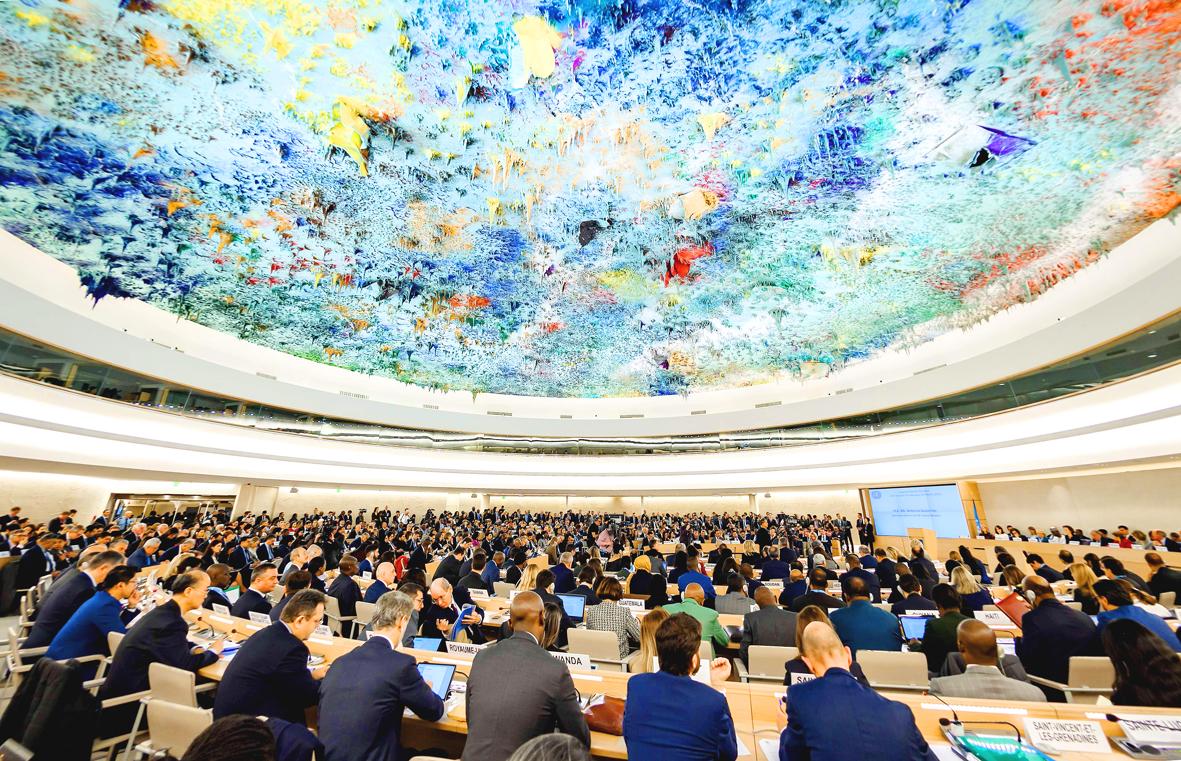UN members need to watch out for Beijing’s abuse of power in the world body’s systems, after a Chinese official was appointed last week to a panel on the UN Human Rights Council (UNHRC), the Ministry of Foreign Affairs (MOFA) said yesterday
Jiang Duan (蔣端), who holds the rank of minister at the Chinese mission in Geneva, Switzerland, was appointed to the council’s Consultative Group as a representative for Asia-Pacific states for a one-year term through March 31 next year.
It is ironic that the Chinese government, with its egregious record on human rights issues, can be admitted into the consultative group to help monitor the human rights conditions in other countries, ministry spokeswoman Joanne Ou (歐江安) said in a statement.

Photo: AFP
The appointment reflects China’s control over UN systems, which deserves the vigilance of all governments, she said.
Beijing’s efforts to expand its influence over the UN system and promote a human rights agenda with “Chinese features,” such as prioritizing development projects, have alarmed democracies and the global community, she said.
China is not qualified to play a leading role in human rights issues, given that many groups, including Human Rights Watch, Amnesty International and Freedom House, have raised concerns about Beijing’s violation of human rights, she said.
The representatives of 22 nations in July last year sent a joint letter to the UNHRC calling on Beijing to stop persecuting Uighurs and other minorities in Xinjiang, Ou said.
The ministry called on all UN member states and the global community to closely monitor Beijing’s actions in the UNHRC to prevent it from abusing power or using its position to cover up its rights atrocities, Ou added.
On Thursday, Hillel Neuer, executive director of the Geneva-based non-governmental organization UN Watch, said Jiang’s appointment was “absurd and immoral.”
“Allowing China’s oppressive and inhumane regime to choose the world investigators on freedom of speech, arbitrary detention and enforced disappearances is like making a pyromaniac into the town fire chief,” Neuer said.
US Representative Chris Smith, a senior member of the US House of Representatives Committee on Foreign Affairs and co-chairman of the Tom Lantos Human Rights Commission, on Sunday also condemned the appointment.
The Chinese government’s record on human rights includes the systematic abuse of religious and ethnic minorities, including Tibetan Buddhists, Uighur and Kazakh Muslims, Falun Gong and “underground” Christians, Smith said.
“There is no justification whatsoever in empowering a Chinese government official, Jiang Duan, to investigate human rights abuses until there is a reckoning with regard to China’s own record,” he said.

Taiwan has received more than US$70 million in royalties as of the end of last year from developing the F-16V jet as countries worldwide purchase or upgrade to this popular model, government and military officials said on Saturday. Taiwan funded the development of the F-16V jet and ended up the sole investor as other countries withdrew from the program. Now the F-16V is increasingly popular and countries must pay Taiwan a percentage in royalties when they purchase new F-16V aircraft or upgrade older F-16 models. The next five years are expected to be the peak for these royalties, with Taiwan potentially earning

STAY IN YOUR LANE: As the US and Israel attack Iran, the ministry has warned China not to overstep by including Taiwanese citizens in its evacuation orders The Ministry of Foreign Affairs (MOFA) yesterday rebuked a statement by China’s embassy in Israel that it would evacuate Taiwanese holders of Chinese travel documents from Israel amid the latter’s escalating conflict with Iran. Tensions have risen across the Middle East in the wake of US and Israeli airstrikes on Iran beginning Saturday. China subsequently issued an evacuation notice for its citizens. In a news release, the Chinese embassy in Israel said holders of “Taiwan compatriot permits (台胞證)” issued to Taiwanese nationals by Chinese authorities for travel to China — could register for evacuation to Egypt. In Taipei, the ministry yesterday said Taiwan

Taiwan is awaiting official notification from the US regarding the status of the Agreement on Reciprocal Trade (ART) after the US Supreme Court ruled US President Donald Trump's global tariffs unconstitutional. Speaking to reporters before a legislative hearing today, Premier Cho Jung-tai (卓榮泰) said that Taiwan's negotiation team remains focused on ensuring that the bilateral trade deal remains intact despite the legal challenge to Trump's tariff policy. "The US has pledged to notify its trade partners once the subsequent administrative and legal processes are finalized, and that certainly includes Taiwan," Cho said when asked about opposition parties’ doubts that the ART was

If China chose to invade Taiwan tomorrow, it would only have to sever three undersea fiber-optic cable clusters to cause a data blackout, Jason Hsu (許毓仁), a senior fellow at the Hudson Institute and former Chinese Nationalist Party (KMT) legislator, told a US security panel yesterday. In a Taiwan contingency, cable disruption would be one of the earliest preinvasion actions and the signal that escalation had begun, he said, adding that Taiwan’s current cable repair capabilities are insufficient. The US-China Economic and Security Review Commission (USCC) yesterday held a hearing on US-China Competition Under the Sea, with Hsu speaking on